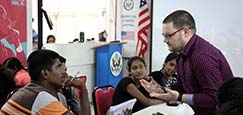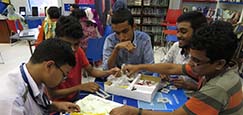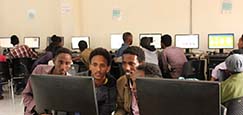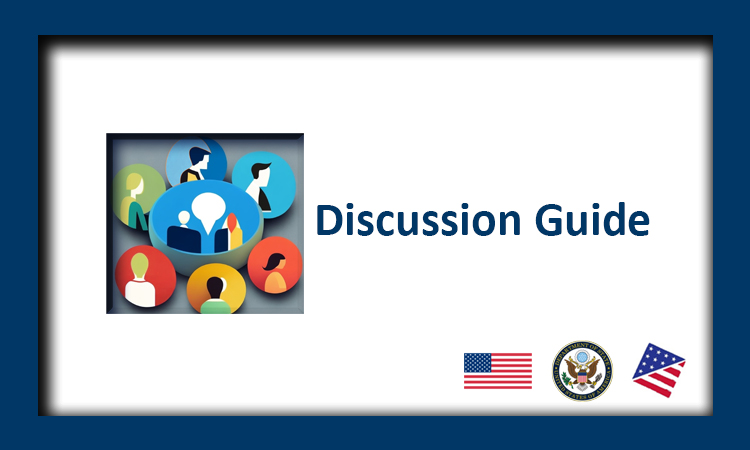TED TALK: OVERCOMING BIASES
DISCUSSION GUIDE FOR AMERICAN SPACES
This discussion guide is designed for programming at American Spaces. American Spaces should work with their Public Affairs Section to ensure that this topic and video are appropriate for American Spaces audiences.
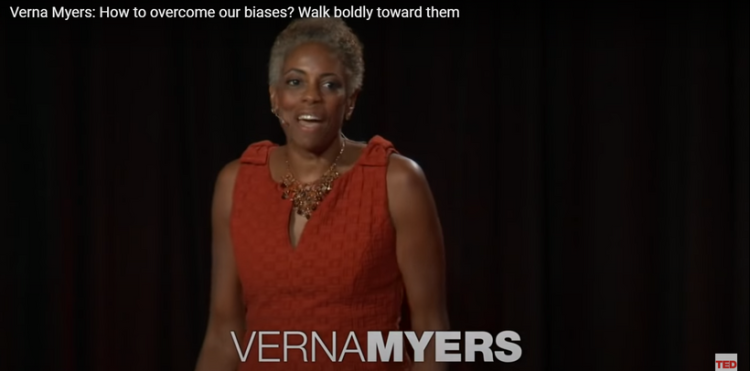
VIDEO INFORMATION
Video Title: How to overcome our biases? Walk boldly toward them Year Release: 2014
Duration: 18 min
English Level: Intermediate Speaker: Verna Myers – Activist, strategist, and advocate for diversity and inclusion
Themes: Racism, unconscious bias, and inclusion
VIDEO CONTEXT
Verna Meyer’s inspirational talk addresses the unconscious biases inherent to all people and how these biases, when left unchecked, lead to issues such as racism. She challenges us to take specific steps to identify and counteract these biases, allowing us to build more inclusive personal and professional lives. She encourages us to “walk towards [our] discomfort”, reminding us that building inclusivity may feel uncomfortable initially before it becomes comfortable. She ends her talk by calling on us to have the courage to speak out when something wrong is happening.
KEY VOCABULARY
Bias – a personal and sometimes unreasoned judgment.
Prejudice – An adverse opinion or leaning formed without just grounds or before sufficient knowledge.
Diversity – The inclusion of different types of people (such as people of different races or cultures) in a group or organization.
Inclusive – Allowing and accommodating people who have historically been excluded because of their race, gender, sexuality, or ability.
Stereotypes – A standardized mental picture that is held in common by members of a group and that represents an oversimplified opinion, prejudiced attitude, or uncritical judgment.
Empathy – The action of understanding, being aware of, being sensitive to, and vicariously experiencing the feelings, thoughts, and experience of another of either the past or present without having the feelings, thoughts, and experience fully communicated in an objectively explicit manner.

Discussion Questions
- Why does unconscious bias occur? Can you think of common examples from your country?
- Verna Myers says we need real people not good people. What does she mean?
- What is the difference between diversity and inclusion and between tolerance and empathy?
- What are practical examples of walking towards your discomfort in both the personal and professional spheres?
Additional Resources
- Implicit Association Test
- National Public Radio Broadcast “The Culture Inside” – This podcast from Invisibilia discusses the part of ourselves we don’t acknowledge.
- American Spaces African American History Toolkit – This toolkit lesson designed for the American Spaces includes plans, videos, photos, exhibits, articles, and PowerPoints on the role of African Americans in U.S. history.
- Talk about Race – From Smithsonian’s National Museum of African American History and Culture, this page provides information, links, and discussion guides to talk about race and identity in a historical and social context.
*Post will need to procure this film. The Office of American Spaces does not endorse all movies as they may not be appropriate for all audiences. Coordinators should screen the films ahead of showing them. Here’s a link with more information on showing movies at American Spaces.
The views expressed in these links and resources do not necessarily reflect those of the U.S. government.
Updated April 2023






